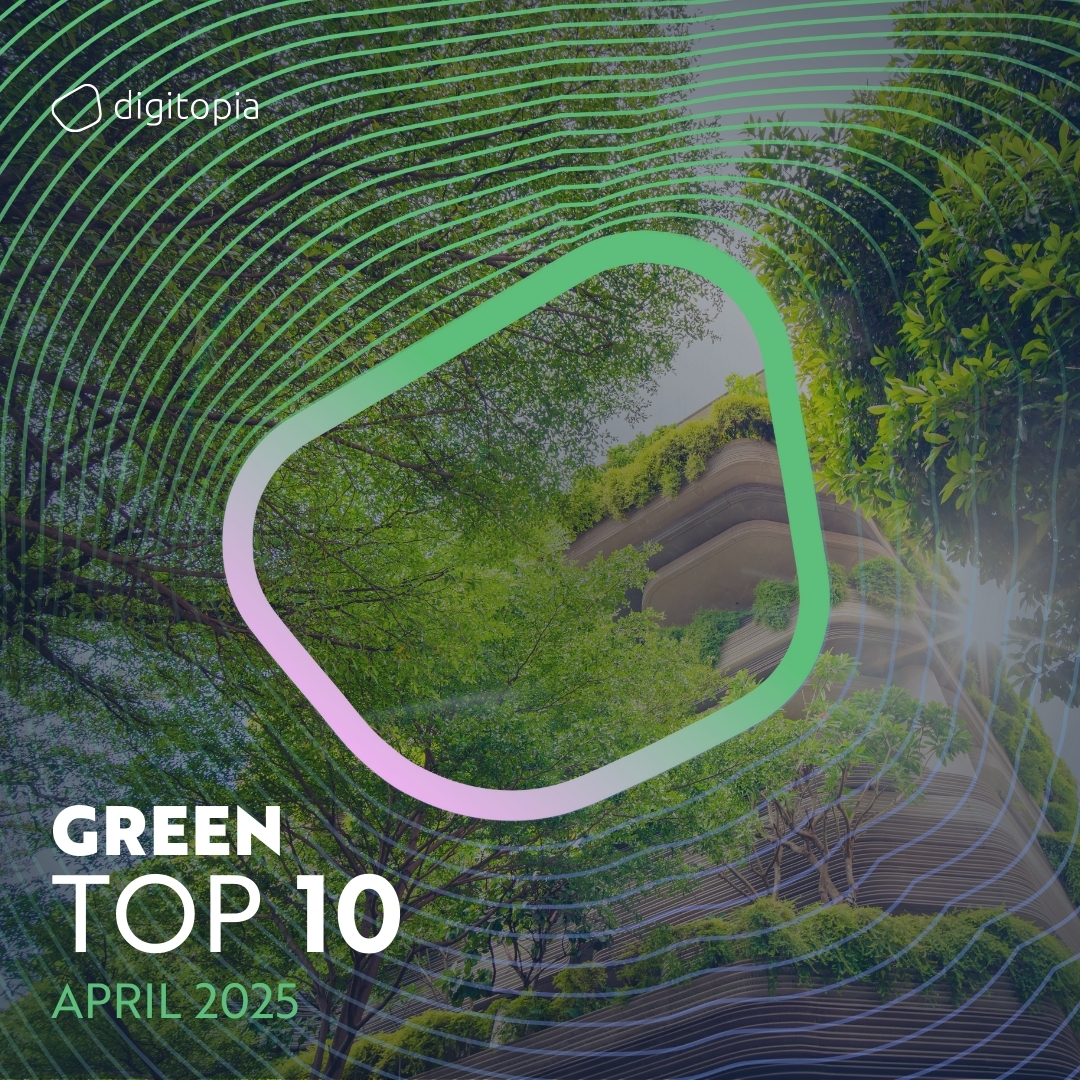
1- Why The OECD Says Green Tech Is Different
The OECD highlights that green technologies—such as green hydrogen, sustainable steel, and battery production—differ from traditional innovations due to their dual objectives of economic growth and significant greenhouse gas reductions. These technologies often require substantial upfront investments and coordinated policy support to scale effectively. The OECD emphasizes the necessity for international collaboration to accelerate the adoption of green tech, particularly in developing countries. Aligning innovation with climate goals is crucial to ensure that green technologies contribute meaningfully to global decarbonization efforts. This approach underscores the importance of integrating sustainability into the core of technological advancement.
Source: Forbes
2- Trump’s Tariffs May Dim Solar Sector’s Future As Energy Demand Spikes
President Donald Trump’s recent implementation of steep tariffs on imported solar components—some exceeding 3,500%—is significantly impacting the U.S. solar industry. These tariffs, aimed at imports from Southeast Asia, are expected to raise the cost of utility-scale solar projects by approximately 30%, potentially reducing new installations in 2025 from an anticipated 35–40 GW to 20–25 GW. While domestic manufacturing has expanded due to incentives like the Inflation Reduction Act, it still falls short of meeting the nation’s solar equipment demand, leading to continued reliance on imports. The increased costs and supply chain disruptions threaten to slow the momentum of clean energy adoption in the U.S., despite the growing demand for renewable energy sources. Industry experts warn that without a stable regulatory framework and sufficient domestic production capacity, the tariffs could hinder progress toward climate goals and energy transition targets.
Source: Forbes
3- ‘Source of data’: Are Electric Cars Vulnerable to Cyber Spies and Hackers?
Electric vehicles (EVs), especially those manufactured in China, are under scrutiny for potential cybersecurity risks, as they are equipped with cameras, microphones, and internet connectivity that could be exploited by hackers or foreign states. British defense firms have advised staff against connecting personal mobile phones to Chinese-made EVs due to fears of data extraction by Beijing. Experts highlight that features like over-the-air updates and device connectivity increase the risk of data exfiltration, particularly for individuals in sensitive roles such as defense or government. While there is no public evidence of Chinese EVs being misused for espionage, China’s National Intelligence Law mandates companies to support state intelligence activities, raising concerns. The UK government acknowledges these concerns and is assessing potential threats from all vehicle types, with some defense entities enforcing stricter rules.
Source: The Guardian
4- The New Hawaiian ‘Freakosystem’ Emerging on Oʻahu
On the Hawaiian island of Oʻahu, a novel ecosystem—dubbed a “freakosystem”—has formed, composed almost entirely of non-native species introduced by humans. In Oʻahu’s lowland forests, native plants and animals have been largely replaced by species such as Brazilian peppertrees, Indonesian cinnamon, and Himalayan roseleaf bramble. This transformation is the result of historical deforestation, agriculture, and the introduction of invasive species, leading to the extinction of many native species. Ecologists view these human-created ecosystems as a glimpse into the future, highlighting the profound and lasting impact of human activity on natural environments. The situation on Oʻahu serves as a warning of how ecosystems worldwide might evolve under continued human influence.
Source: BBC
5- Imagine 2200: Climate Fiction for Future Ancestors – 2025 Collection
Grist’s 2025 Imagine 2200 climate fiction contest showcases 12 visionary short stories that explore hopeful futures shaped by climate solutions and cultural resilience. This year’s collection features global voices, with narratives set in diverse locales such as Lagos, Guadeloupe, and Koreatown, emphasizing the importance of cultural heritage in envisioning sustainable futures. Stories like “We Cast Our Eyes to the Unknowable Now” and “The Isle of Beautiful Waters” blend speculative fiction with themes of community and environmental restoration. The contest received over 1,200 submissions from more than 100 countries, highlighting a growing global engagement with climate storytelling. Through these narratives, Grist aims to inspire readers to imagine and work towards a just and thriving world.
Source: Grist
6- World Leaders From China to EU Hold Climate Meeting Without US
On April 23, 2025, a high-level virtual climate summit convened by the United Nations and Brazil brought together leaders from China, the European Union, and other nations, notably excluding the United States. Chinese President Xi Jinping committed to more stringent greenhouse gas emission reductions by 2035, encompassing all sectors of the economy, positioning China as a proactive leader in global climate efforts . UN Secretary-General António Guterres emphasized that no government or fossil fuel interest could impede the global transition to clean energy . The absence of the U.S. from this summit underscores its growing isolation in international climate diplomacy under President Trump’s administration . Participating nations agreed to submit updated national greenhouse gas emission plans by September, ahead of the COP30 summit in Brazil, and to develop a roadmap for delivering $1.3 trillion annually in climate finance to developing countries by 2035 .
Source: Bloomberg
7- New CSR Policy Framework Released by UN: A Global Call for Responsible Business
On April 28, 2025, the United Nations unveiled a comprehensive Corporate Social Responsibility (CSR) Policy Framework aimed at guiding businesses worldwide toward ethical, inclusive, and environmentally responsible practices. This framework is structured around five key pillars: Human Rights Protection, Environmental Stewardship, Inclusive Economic Growth, Ethical Governance and Transparency, and Stakeholder Engagement and Collaboration. Distinctively, it introduces mandatory reporting benchmarks and global certification pathways, emphasizing the need for measurable and authentic impact. The framework also allows for local adaptation, ensuring CSR initiatives are culturally and regionally relevant. Implementation support, training programs, and a recognition platform for CSR excellence are set to roll out over the next 18 months, signaling a significant shift in global business accountability.
Source: CSR Reporters
8- EPA Begins Layoffs of Environmental Justice Staff
On April 22, 2025, the U.S. Environmental Protection Agency (EPA) issued termination notices to nearly 200 employees from its Office of Environmental Justice and External Civil Rights, citing a realignment of the agency’s mission under the Trump administration. These staffers had previously been placed on administrative leave in February amid legal disputes. EPA Administrator Lee Zeldin criticized the effectiveness of environmental justice programs, arguing that funds were not being utilized for direct environmental remediation. Union leaders, including Joyce Howell of AFGE Council 238, condemned the layoffs as a betrayal of the agency’s commitment to public and environmental health. This move is part of broader plans to restructure the EPA and reduce its budget by 65%.
Source: Reuters
9- Global Energy Leaders Convene in London to Address Future Energy Security
On April 24–25, 2025, the International Energy Agency (IEA) and the UK government co-hosted the Summit on the Future of Energy Security at Lancaster House in London, bringing together representatives from 60 countries and over 50 major energy companies. The summit focused on redefining energy security to encompass not only traditional concerns like oil and gas supply but also emerging challenges such as critical mineral dependencies, cybersecurity threats, and the impacts of climate change. UK Prime Minister Keir Starmer announced a £300 million investment in the domestic offshore wind supply chain, reinforcing the UK’s commitment to achieving net-zero emissions by 2050. European Commission President Ursula von der Leyen emphasized Europe’s plans to mobilize over €100 billion to support clean manufacturing, aiming to build the clean industries of the future within Europe. While the United States participated in the summit, its delegates expressed skepticism about aggressive net-zero targets, contrasting with the UK’s and EU’s firm commitments to clean energy transitions.
Source: IEA
10- New B Corp Rules Unveiled After Critics Allege Greenwashing
B Lab, the nonprofit organization behind B Corporation certification, has announced a significant overhaul of its standards to address growing concerns about greenwashing and to ensure that certified companies are genuinely committed to social and environmental responsibility. The new framework introduces more stringent requirements, including mandatory actions on climate change, fair wages, and human rights, moving beyond the previous flexible scoring system that allowed companies to offset poor performance in one area with excellence in another. This change comes in response to criticism that the B Corp label was being used by some companies more as a marketing tool than a reflection of true ethical practices. The updated standards aim to restore credibility to the certification and reinforce its role as a benchmark for responsible business conduct. B Lab plans to implement these new rules over the coming months, with a focus on transparency and accountability.
Source: FT

